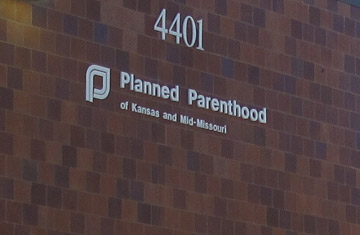
A Planned Parenthood clinic in Overland Park, Kans., as photographed on June 22, 2011
Kansas will now just have one clinic in the state allowed to provide abortions, as the state signaled Thursday, June 30, that Kansas' only other two providers are out of business because of tough new licensing requirements. Advocates of abortion rights allege it's part of a coordinated, national campaign to limit women's access to reproductive freedom, while abortion opponents argue that Kansas' new rules merely aim to protect the health women and viable fetuses.
"This is radical, extreme government intrusion into private health care," Peter Brownlie, president of Planned Parenthood of Kansas and Mid-Missouri, said Thursday as his clinic filed suit in U.S. District Court to have the new regulations thrown out. "We have been targeted in this bill, and Kansas women are the ones who will suffer ... This wasn't chipping away at the edges — this was a full frontal assault."
Within an hour of his announcement, the Kansas Department of Health and Environment issued a sparsely worded statement that it had approved one of the three licenses it had reviewed, without naming names. Despite the state's secrecy, it was clear that Planned Parenthood had survived, because the other two providers, a clinic called Aid for Women in Kansas City, Kans., and a father-daughter private practice in nearby Overland Park, had already acknowledged that their offices didn't meet the new codes. Released two weeks ago, the regulations, among other things, dictate the required square footage for janitors' closets, staff dressing rooms and patient lockers.
Those two providers have likewise gone to federal court seeking an injunction against the "burdensome and costly requirements that are not medically necessary or appropriate." U.S. District Judge Carlos Murguia has set a 3 p.m. hearing for Friday, July 1. (Planned Parenthood is expected to drop its separate suit since it received a license.) "Today is our last day," said Jeff Pederson of Aid for Women on Wednesday, adding that his group would "have to gut the place" to be in compliance.
Before Thursday's announcement, there was a threat that Planned Parenthood would be denied a license too, which would have made Kansas the only state in the nation where a woman could not receive legal abortion services. Even with Planned Parenthood kept in business, the law will strain the clinic's capabilities, Brownlie said. About 8,000 women a year seek abortions in Kansas; Planned Parenthood performed about 5,000 of them last year, the other two providers handling 3,000. That likely includes a large number of patients from across the state line, where Missouri already has tough restrictions in place and there are no clinics in the urban core.
"As was the intent of Governor [Sam] Brownback and the Kansas Legislature, it will be harder for a woman in Kansas to get an abortion [as of Friday] unless the court acts," said Brownlie. The clinic was able to comply by purchasing a "neonatal crash unit" and other emergency supplies for live births, which Brownlie says never happens at Planned Parenthood, which offers abortions up to the 21-week mark.
Mary Kay Culp, executive director of Kansans for Life, says it is not the law's intent to shut down abortion clinics and notes that although South Carolina has a similar law, clinics there have survived. Abortion providers are "putting on a show," she says. "They're the ones who said if you make abortion legal, we'll keep women safe," she says. "Why wouldn't you want rooms big enough to get gurneys in and out of?"
Dr. Herbert Hodes, one of the two providers now filing suit, says abortion is just one of the services he and his daughter provide in their private ob-gyn practice. He delivers babies at nearby hospitals and performs other procedures, like tubal ligations, in his office. He says there's no reason to mandate patient lockers — he notes that hospitals usually just put a patient's belongings in a bag under the gurney when they go from pre-op to surgery to recovery.
"It's a joke and a sham," Hodes tells TIME. "The only purpose is to shut down access to abortions." He says he complies with rules from the Kansas Board of Healing Arts and the American College of Obstetrics and Gynecologists since "they're realistic regulations drawn up by doctors for doctors. We all know how much legislators know about health care for women — nothing," Hodes says.
Kansas legislators have tried to implement similar regulations before but gained traction only with the election of the conservative Brownback. Kansas is also one of the states where lawmakers are trying to block funding for Planned Parenthood. The state has long been a hotbed for the abortion issue; it's where Dr. George Tiller, who famously offered late-term abortions in Wichita, was murdered in 2009.
Pederson of Aid for Women echoes Hodes' complaints about unnecessary regulations, saying that one of the new codes mandates a two-hour recovery period. He says that when he accompanied his father to get his teeth pulled, his dad was sedated, yet they left 10 minutes after the procedure was complete. "The women don't want to stay here two hours, and they don't need to. They have a caregiver with them. They're drunk, but they're walking."
The majority of Pederson's clients are low-income or minorities, he says, and he fears folks will go back to pre–Roe v. Wade days of seeking home remedies or other means to avoid an unwanted pregnancy. "I can remember what it was like before."
